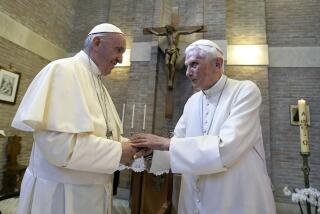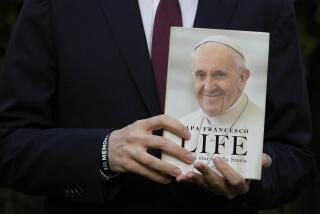Joaquin Navarro-Valls, spokesman for Pope John Paul II, dies at 80
Joaquin Navarro-Valls — a suave, silver-haired Spaniard who was a close confidant of Pope John Paul II and served for more than two decades as chief Vatican spokesman — has died at the age of 80.
Manuel Sanchez, spokesman for the Opus Dei movement in Rome, of which Navarro-Valls was a member, said he died Wednesday after a long illness.
Navarro-Valls was fiercely loyal to John Paul, accompanying the Polish pope on most of his 104 international trips. He also performed delicate diplomatic missions, such as helping to prepare the pope’s historic pilgrimage to Cuba.
Known for his coolness and restraint, Navarro-Valls nearly broke into tears when John Paul was dying in April 2005. He choked up and walked out of a conference room when a German reporter at a briefing on the pope’s condition asked him how he personally felt.
“I was trying to keep my emotions in check, but then a reporter asked how I was experiencing the passing of the pope personally, and I couldn’t control myself,” he explained later.
Navarro-Valls, who spoke four languages, was a foreign correspondent for the Spanish newspaper ABC when John Paul offered him the job as director of the Vatican press office. He was the first journalist to hold the post.
He was a lay member of the conservative Catholic movement Opus Dei, an order much favored by the pope, but Navarro-Valls always insisted the fact that he was president of Rome’s Foreign Press Assn. at the time weighed heavily in his hiring at the Vatican.
Navarro-Valls was credited with bringing computer technology to the press office, promoting the use of multiple languages in the Italian-centric press operation and giving journalists better access — making him the perfect press aide for a pope known for his media savvy.
Navarro-Valls held degrees in both journalism and medicine, specializing in psychiatry.
Some saw the combination as perfect for his job as papal “spin doctor.”
In 1997, just a few months before the papal pilgrimage to Cuba, he flew to Havana and was summoned for what turned out to be a six-hour-long encounter with Cuban leader Fidel Castro.
Navarro-Valls said he told Castro that the pope had one particular request: that the regime restore the Christmas holiday that was abolished under communism. Castro kept his word to do so, and the holiday is still celebrated today.
With three successive non-Italian popes, Navarro-Valls helped lead a quiet revolution to internationalize the Vatican. The current spokesman is an American, Greg Burke, a former Fox correspondent.
Burke’s assistant, Paloma Garcia Overo, is the first woman to hold a ranking position in the press office. She worked as a Spanish TV journalist before accepting the Vatican post.
Burke said that Navarro-Valls “embodied what Ernest Hemingway defined as courage: grace under pressure.”
He recalled Navarro-Valls working at the U.N. Population Conference in Cairo in 1994, calling it “one of the best examples of what Pope Francis calls ideological colonization. It was fascinating to see someone who was defending the faith, but he wasn’t on the defensive. He was leading the fight.”
Burke said: “I didn’t always agree with Navarro, but he always behaved like a Christian gentlemen, and those can be hard to find these days.”
Navarro-Valls found himself under fire from some in the Vatican when he became the first official to publicly hint that John Paul was suffering from Parkinson’s disease. The pope’s condition clearly was evident, but not something many wanted to disclose.
During a 1996 trip to Hungary, at a time when John Paul looked extremely frail, Navarro-Valls said the pope suffered from an “extra pyramidal syndrome.” His comments referring to drug-induced side effects nearly cost the Spaniard his job.
After John Paul died, Navarro-Valls remained as spokesman for 15 months with the new pope, Benedict XVI.
“I am conscious of having received in these years so much more than I have been able to give,” he said upon resigning in July 2006.
He was not married and lived in an Opus Dei residence in Rome.
More to Read
Start your day right
Sign up for Essential California for the L.A. Times biggest news, features and recommendations in your inbox six days a week.
You may occasionally receive promotional content from the Los Angeles Times.






